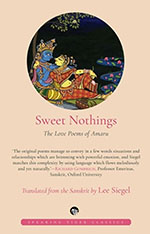Every now and then there is a spurt of interest in Amarushatakam, a compilation of a hundred love poems, dated around the 11th century AD. If viewed as part of the Indian literary tradition, such poems singing the praise of love, personal and yet universal, to which even an ordinary person can relate, have a hoary tradition. Amarushatakam and its precursor Sringara Shatakam by Bhartrahari, follow motifs and approaches similar to Hala’s Gathasaptasati in Prakrit (dating to the 1st century AD). Tamil literature too has any number of them, for example, in the Kurantohai, Ainkuru Nooru, Ahananooru and so on. The style is conversational, pithy and provocative. While saptashati means 700, nooru or shatakam mean hundred and Amarushatakam literally means a hundred poems of Amaru.
In his recent rendition of the Sanksirt original in English titled Sweet Nothings: The Love Poems of Amaru, Lee Siegel has given us 130 verses. Last year AND Haksar’s translation titled The Shameless Heart: Love Lyrics of Amaru Shatakam, mentioned that there are 102 verses in the oldest recension by Arjuna Varma Deva (c. 1215 AD). Subsequently more seem to have been added on.
The question about who Amaru was and whether all the verses were compiled by him or written by him is a question much debated upon by scholars. But Siegel does not write an introduction and so does not take a stand on it.
Continue reading this review

